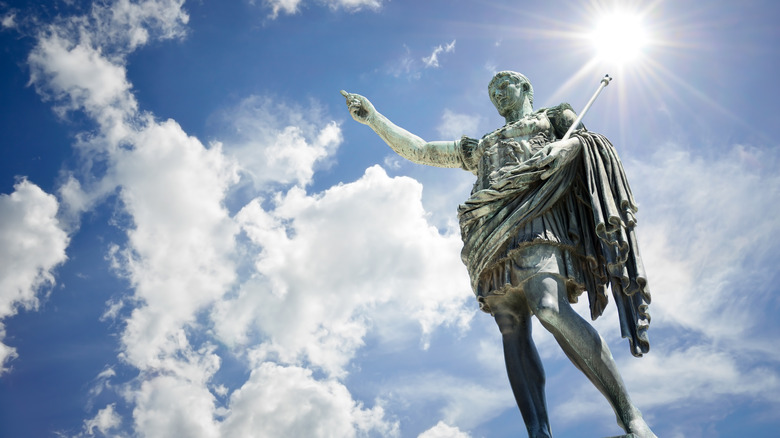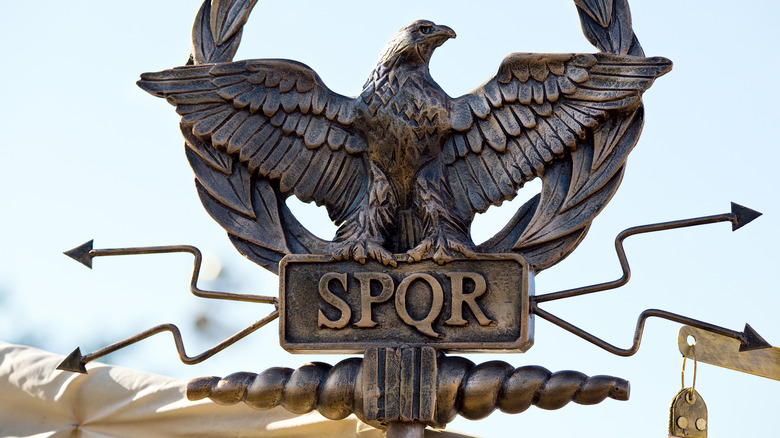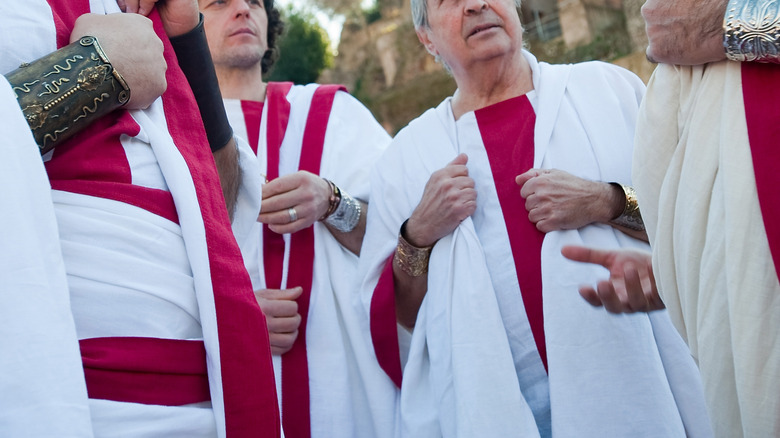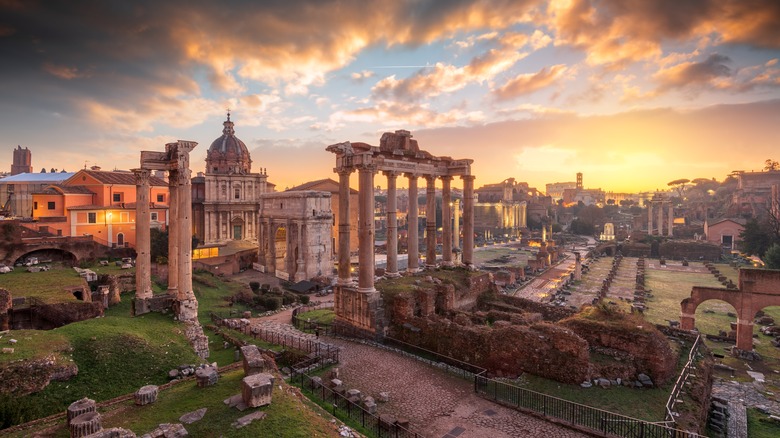How A Dysfunctional Government Broke Ancient Rome's Republic
In case anyone needs reminding: no civilization lasts forever. Folks who lived in Napoleonic France in the early 18th century lived at the apex of their own history, at the furthest point in time. Same goes for those alive during the Norman invasion of 1066 C.E., or the fall of the western half of the Roman Empire in 476 C.E. To people living in the Middle Ages, there was no "middle" era of time, only the present. But in the end, every single widespread, powerful civilization — Mayans, Babylonians, Greeks, etc. — has collapsed, dissolved, or at least radically changed.
But even though all civilizations vanish, the reasons vary. The Aztecs, for instance, were obliterated by warfare in 1521 when Spanish conquistador Hernán Cortés sieged the Aztec capital, Tenochtitlán (per History). The Minoans in modern-day Crete slowly succumbed in 1450 B.C.E. after hundreds of years of natural disasters and unlucky circumstances (per World History Encyclopedia). So when Marcus Junius Brutus conspired to kill Julius Caesar on March 15, 44 B.C.E. ("Beware the ides of March!"), do you figure he or anyone else sensed the end of the Roman Republic? About 450 years earlier, the republic had formed when the last Etruscan king, Tarquin the Proud, was deposed in 509 B.C.E., as Live Science recounts. By 27 B.C.E., the republic completely fell, and a central figure — an emperor this time — ruled Rome once again. Such a fate, though, had been coming for quite some time.
For the wealthy, by the wealthy
On the surface, the Roman Republic might have seemed well put-together, stable, and not too different from a modern, developed, democratic nation. There was a constitution, a written body of laws, elected officials, senators, governors, and lots of other very recognizable trappings, as ThoughtCo describes. Everyday citizens got up in the morning, went to work, chilled at sporting events like wrestling and chariot races, hung out in public bathhouses, drank wine, and had a decent diet of cereals, vegetables, and sometimes meat. The poor even had access to free water at public drinking fountains, as the World History Encyclopedia says. Toss some cell phones in the mix, and it might as well be 2022.
But like 2022, cracks were visible. As National Geographic explains, Rome's "representative" government had been fashioned from the onset by the wealthy, for the wealthy. Despite its SPQR moniker — Senātus Populusque Rōmānus (The Senate and the Roman People) — only people from patrician (noble) families could hold political or religious office. The republic evolved over hundreds of years, and the specifics of its government changed, but elections never developed beyond commoners appointing the rich.
Those commoners, however, formed the bedrock of Roman society. Native-born flocked to urban centers, like the highly cosmopolitan Rome, and got packed into tenement blocks alongside immigrants who couldn't find work. There, poverty and poor education abounded, along with a lack of safety and lax governmental oversight. And in the countryside? Folks just farmed away.
Dominion over the peninsula
Things go from obviously doomed to even more obviously doomed when considering Roman militarism. Remember that "Italy" didn't exist until 1946, about 75 years ago. Back at the onset of the Roman Republic in 509 B.C.E., the Italic peninsula was full of various tribal groups: the Etruscans, Umbrians, Venetians, Corsicans, Latins, and more, as World History Encyclopedia outlines. Competition was ferocious, and warfare constant. After Rome's final Etruscan king, Tarquin the Proud, was deposed in 509 B.C.E., the republic — reared in violence — decided on safety through bloodshed. Bit by bit, for its entire 500-year life, the republic swarmed up the Italic peninsula in a non-stop cavalcade of military campaigns.
First on the "to be conquered" list? Etruria, who had lorded over Rome for centuries. As Live Science says, Rome took a whole century — until 396 B.C.E. — to bring the Etruscans to their knees. From there, Rome turned to the Samnites to the east, defended from the Gauls in the north, and by 225 B.C.E., could reportedly field an army of a staggering 700,000. Massive numbers, plus regular troop rotation and superior equipment and tactics, made Rome an absolute military superpower.
And yet, dominion yields inherent instabilities. As Rome's landmass grew, so did its need for precise administration. Lawmakers responded by crafting more red tape and more complex and convoluted laws, which itself strained the republic even more and encouraged loopholes. At the same time, it never fixed any of its mismanagement at home.
Deep bribery and corruption
Even while the Roman Republic's poor grew poorer, its laws metastasized, and while it spent nearly 500 ceaseless years beating back its neighbors on the Italic peninsula, the inner guts of its government fell to rot. Corruption, nepotism, and heart-heartedness ruined the republic from within.
As Students of History describes, wealthy patricians — those in power — bought favors from friends and votes from the public, which eroded trust between classes. Meanwhile, the republic's economy of the enslaved, often utilizing people from conquered land, undermined the efforts of wage earners at home. Farmers, the bread and butter of society, couldn't compete and went broke. Over time, this caused riots to break out in urban areas because poorer people were starving and wanted land reform. As Live Science says, rioters killed government officials on more than one occasion — in 121 B.C.E., for example, riots killed thousands, which eroded trust further. The republic's war-minded culture also inured the public to this type of violent "problem-solving." All the while, private businesses far away from Rome's seat of government stripped new territories of money by padding tax-collection bids and then keeping all the excess funds.
And unbelievably, this whole time, Rome never had a domestic police force. As things deteriorated, the wealthy hired private security forces who went rogue and stole from the people they were supposed to protect, even murdering them. Especially from 146 B.C.E. to its final gasp in 27 B.C.E., the Roman Republic fell into an irrecoverable downward spiral.
A broken seat of government
So far, we've painted a picture of absolute mayhem in Rome's streets. However, the Roman Republic still "functioned" through the 1st century B.C.E. That is to say, "equality under the law" — a familiar phrase today — was still the stated, accepted norm, as US History.com outlines. Those not enslaved in new territories were still invited to become Roman citizens, and by 90 B.C.E., even non-Roman allies could apply for citizenship. And yet, the republic's veneer of order is part of the reason why its demise was so insidious: no one thought things could "get that bad," so to speak.
Eventually, those in power started behaving in more and more brutal and ludicrous ways — out in the open. History tells us that senators themselves beat a public official, Tiberius Gracchus, to death in 133 B.C.E. because he pushed for land redistribution to the poor. They even had almost 300 of his followers slaughtered. Political self-obstructionism became the norm, particularly when votes went against the wishes of various power groups. In 59 B.C.E., History reports a counsel working with Cato the Younger even tried to shut down the government by declaring every single calendar day a holiday. Meanwhile, per Live Science, rebellions and strongmen started rising up across the peninsula: various communities from 91 to 88 B.C.E., the gladiator Spartacus in 73 B.C.E. (via World History Encyclopedia), and eventually Pompey in 66 B.C.E. The latter notably formed an alliance with none other than Julius Caesar himself.
Dictator for life
So then, is it any wonder why a power-hungry dictator stepped into the vacuum of the Roman Republic's fading power? And yet, control didn't come easily for Julius Caesar. As Live Science says, Caesar formed a three-person agreement between him, military leader Pompey, and ultra-rich funder Marcus Licinius Crassus. The outlet notes that Crassus died, Caesar gained power on military campaigns from 58 to 50 B.C.E., and he and Pompey fought until Caesar finally won. And then, when Caesar was proclaimed "dictator for life" for life in 44 B.C.E., he was assassinated about two months later, as History recounts.
Ironically, it was Caesar's assassination that finally decapitated the Roman Republic. His death created another power vacuum, into which stepped Caesar's great-nephew and adopted son, Octavian. Octavian allied with Marc Antony, one of Caesar's famed generals, to defeat Caesar's assassins — Brutus and Cassius — before Octavian and Mark Antony turned on each other. In the end, after a whole lot more fighting and a now-historical suicide committed by Antony and his lover, Cleopatra, Octavian was the only one left standing.
In 27 B.C.E., Octavian became "Augustus," Rome's first emperor (via History). Thus the republic effectively died. As National Geographic says, Augustus could introduce laws, veto them, command the army, decide who gets to hold public office, and more. The Senate still existed, but in a symbolic role more than anything else. From then, Augustus simply went on conquering. Future emperors took his baton and expanded the empire through Europe into modern-day U.K. and more.





